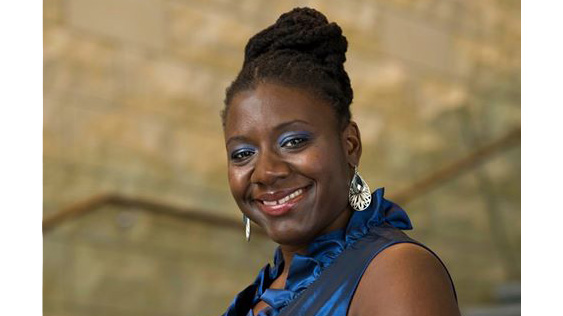On Saturday and Sunday April 15, the Englert, 221 E. Washington St., will host the Reclamation Workshop, a writing and storytelling workshop led by Derek Nnuro and Tameka Cage Conley. The workshop will focus on the literature of the African Diaspora, the movement of African people from their native continent to other parts of the world, notably to the Americas. It will conclude with a reading on April 15.
The event is part of a larger program, the Englert Wavelength Series, which gives youths and adults an arts education outside the classroom. Englert Executive Director Andre Perry said he hopes attendees leave the workshop feeling enlightened.
“We are very excited to have Tameka and Derek leading the first workshop,” Perry said in an email to The Daily Iowan. “They are both wonderful writers and accomplished cultural thinkers. Furthermore, they are extremely engaging as teachers; they will truly bring their students into the work in remarkable ways.”
Nnuro is a Ghanaian-American Writers’ Workshop graduate and is working on a novel. Conley, who was born in Louisiana, writes fiction, poetry, plays, among other things, and is in her final semester at the Workshop. Both have received distinguished fellowships from around the country.
RELATED: Armstrong: Young writers in Iowa’s juvenile diaspora
Nnuro and Conley said in an email to The Daily Iowan this workshop was created because they believe in the value of shrinking the gap created by black people on each side of the Atlantic.
“We use literatures of the African Diaspora to demonstrate that African American and African writers have long been in conversation, evidenced by similar references to custom, culture, sufferings, and oppressions enacted by white supremacy, colonialism, capitalism, exploitation, and sexism,” they said.
They also said literature on the African Diaspora centers on triumph and tragedy, something that can empower humans. The work is mostly written in English; however, the presenters said, diaspora writers are often daring in the way they approach the language.
“The work does not only upend but constantly interrogates language. In the study of fiction writing, this might be referred to as ‘voice,’ ” they said. “Writers are in perpetual pursuit of their unique voices, and an exploration of the work of writers of Africa and its diaspora can be a very empowering process for writers.”
RELATED: Insatiable poetry, limitless mind, steady voice
Conley said she tends to write about personal journeys one can take, through trauma, healing, adventure, and the beauty of these journeys.
“Thematically, I am interested in the black family and how the toxic institutions of history have sought to dissect, destroy, and dismantle it, and how in revolutionary fashion, it has remained, though often tattered,” Conley said.
Nnuro said that because writers are influenced by their backgrounds, a first novel can usually be seen as a kind of autobiography.
“Just like any other writer, my cultural identity — in this case, Ghanaian — bleeds through my work,” Nnuro said. “To be honest, I have no stories to tell otherwise.”
Both Nnuro and Conley said they hope participants walk away with a sense of self-empowerment through their art.
RELATED: Nigerien author Antoinette Tidjani Alou to read at Prairie Lights
Where: Englert, 221 E. Washington St.
When: Saturday, 10a.m.-6p.m., April 15, 2-5p.m.



